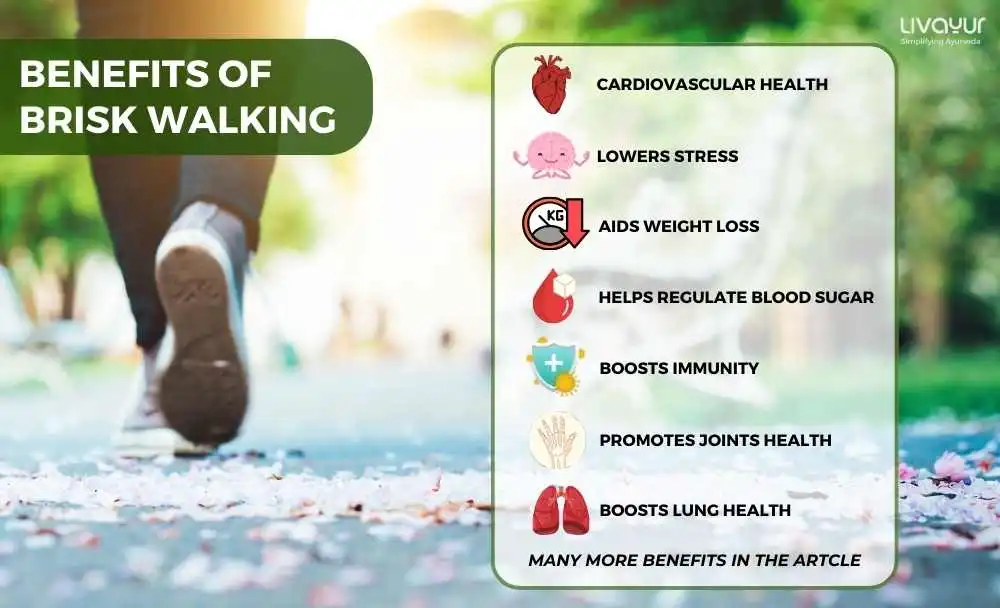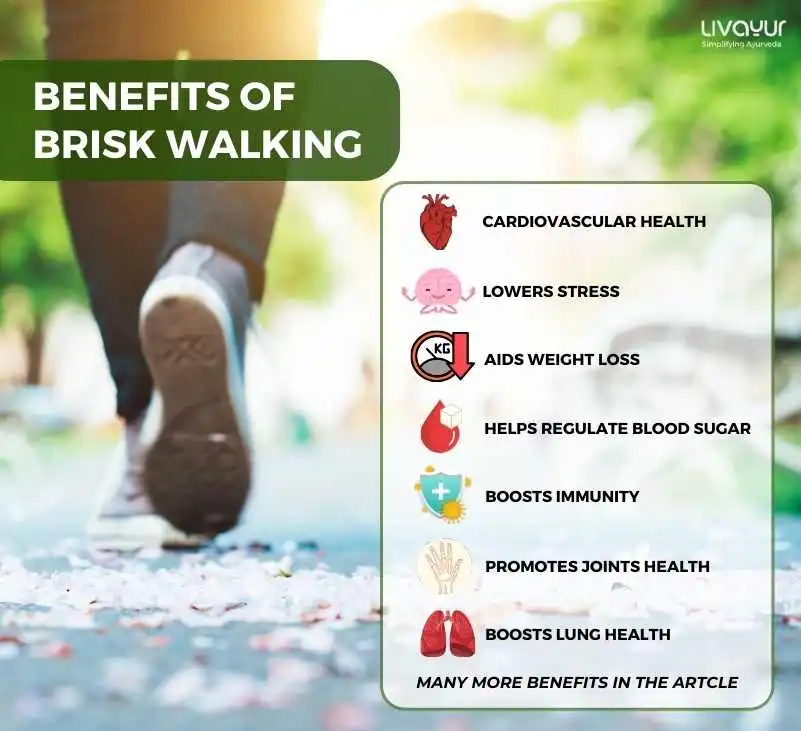This article has been reviewed by experts

Brisk walking is an accessible form of exercise that offers numerous health benefits. Brisk walking means walking at a pace that’s faster than a stroll. What’s more, to perform this exercise, you need nothing more than a pair of comfortable shoes and a bit of motivation!
Brisk walking speed can vary from person to person, but it is generally considered to be around 3 miles per hour. [7]. In this article, we will explore 20 incredible brisk walking benefits that will inspire you to lace up your sneakers and hit the pavement for treading toward better health.
- Reduces Risk of Heart Disease
Brisk walking is great for maintaining cardiovascular health. Walking for 30 minutes per day is known to lower the heart rate, regulate blood pressure, and strengthen the heart. [1]
- Lower Stress
Walking releases endorphins in the body that enhance mood and emotional health. It also helps to reduce stress and associated health conditions. [1]
- Effective Weight Loss
Walking can aid in weight loss. A 30-minute daily walk can effectively burn approximately 150 calories per day. [1]
- Blood Sugar Management
A short walk after a meal can lower your blood sugar levels and promote stability. This is especially beneficial for those with diabetes as it helps in regulating blood sugar levels.[1]
- Boosts Immune System
Walking increases blood flow, reduces stress, and strengthens antibodies, fortifying your immune system. This makes your body better equipped to fend off illnesses.[1]
- Promotes Joint Health
Walking helps lubricate and strengthen muscles and enhances blood flow to cartilage, benefiting joint health. It’s a low-impact exercise ideal for those with arthritis and osteoporosis concerns. [1]
- Reduces Food Craving
Walking is also known to reduce the need to have sugary foods. This can prove highly beneficial in your endeavor to manage or lose weight.
- Lowers Cancer Risk
Brisk walking and other moderate-intensity exercises can lower the risk of colon, breast, and endometrial cancer. [1]
- Improves Sleep Quality
Walking can help improve the quality of your sleep. You get restful sleep, which can ultimately contribute to better health.
- Boosts Lung Health
Brisk walking is known to enhance your lung health. It improves lung health by reducing your risk of heart disease and Chronic Obstructive Pulmonary Disease (COPD). [2]
- Enhances Cognitive Function
Incorporating a regular walking routine can have a positive impact on your cognitive abilities. This includes improvements in memory, thinking, and learning. Moreover, it reduces the risk of developing dementia.[2]
- Promotes Mental Well-being
Walking reduces stress and alleviates symptoms of anxiety and depression. It contributes to improved sleep quality, energy levels, and overall mood. [2]
- Elevates Vitality
Walking can significantly reduce fatigue and boost your energy levels, especially if you are tired after a day’s work. [3]
- Improves Self-Esteem
A regular walking routine can significantly enhance your self-esteem. Walking stimulates the release of endorphins, which lead to improved self-confidence, energy levels, and self-perception. [3]
- Supports Digestive Health
Brisk walking also has a positive impact on your digestive system. It helps to alleviate constipation by enhancing blood flow to the stomach and intestines as well as prevent stress-induced overeating, promoting healthy digestion.[3]
- Beneficial during pregnancy
Brisk walking is beneficial during pregnancy as it can reduce pregnancy-related complications such as gestational diabetes mellitus (GDM), preeclampsia, and excessive gestational weight gain. [4]
- Enhances Productivity
Individuals who incorporate brisk walking exhibit increased enthusiasm and reduced stress. The stress-relief and mood-enhancing benefits of walking further contribute to heightened productivity, whether at work or home. [5]
- Promotes Skin Health
You are most likely to sweat when taking a walk. Sweating helps eliminate the dead cells, dirt, bacteria, and oils from your skin. It is, in fact, a healthy detoxification process for your body and skin. [5]
- Prevents Chronic Illness
Walking helps to regulate blood sugar levels and lower the risk of developing type 2 diabetes. It is also great for heart health. Thus, it prevents the risk of developing chronic illnesses. [6]
- Improved Posture
Brisk walking helps develop better posture by strengthening core muscles. [8][9]
FAQs:
1. How fast should I walk?
Aim for a pace that’s faster than a leisurely stroll but not too fast to have a conversation comfortably.
2. How much should I walk daily for health benefits?
You should walk for at least 30 minutes a day, five days a week.
3. Can brisk walking help with weight loss?
Brisk walking helps in weight loss by effectively burning extra calories.
4. How to Incorporate Brisk Walking in Your Daily Routine?
A brisk 30-minute walk equals approximately 3,000 steps. It is recommended 150 minutes of physical activity each week. So consider allocating 30 minutes of walking a day for five days a week. You may take several 10-minute walks throughout the day or take longer walks when time permits. [6] So take the first step towards brisk walking today!
Disclaimer: This article is written from a health and lifestyle perspective. It is for general information and not meant to substitute any medical advice. Please consult your doctor for appropriate medical consultation.
References:
1 . https://health.clevelandclinic.org/benefits-of-walking/
3. . https://www.sciencedirect.com/science/article/pii/S2095254618301029
4. https://www.nhs.uk/live-well/exercise/running-and-aerobic-exercises/walking-for-health/























18 Comments